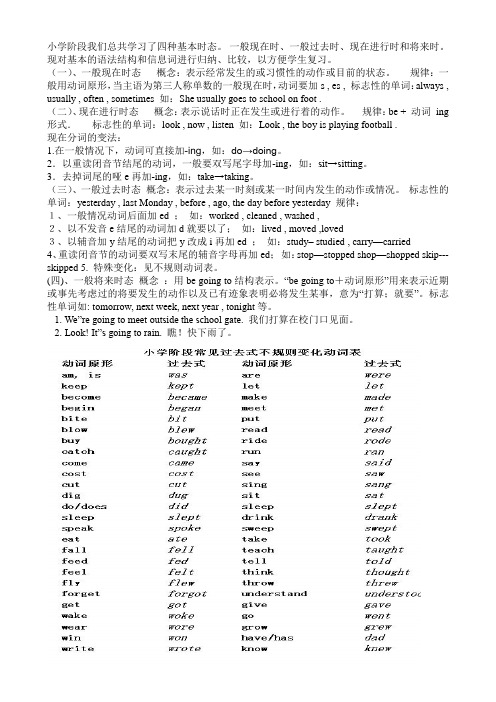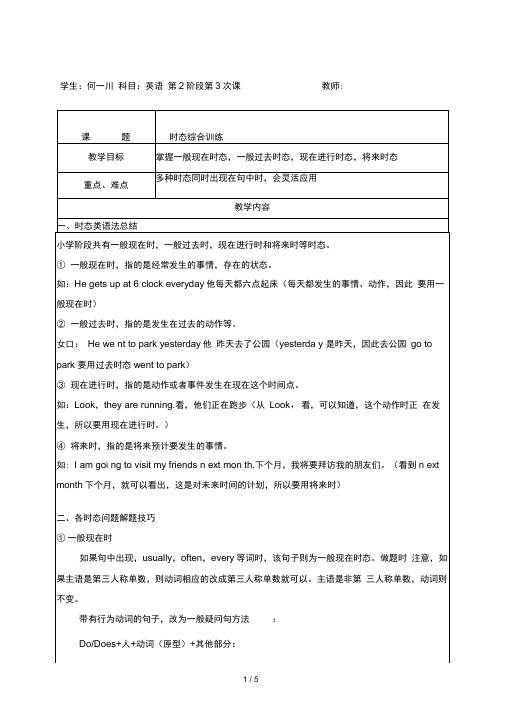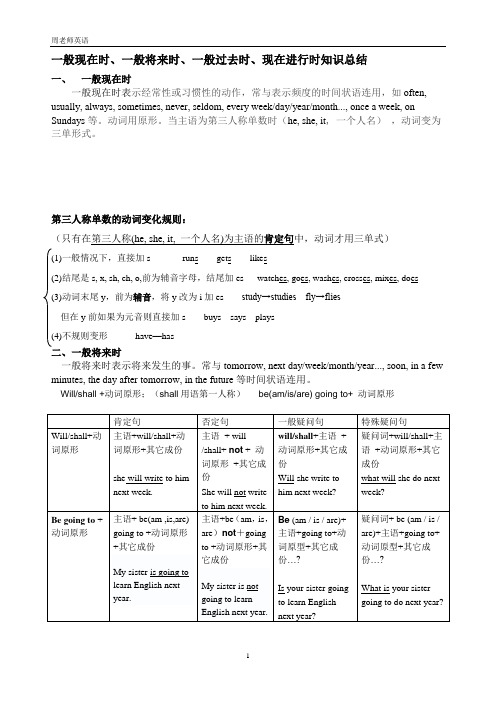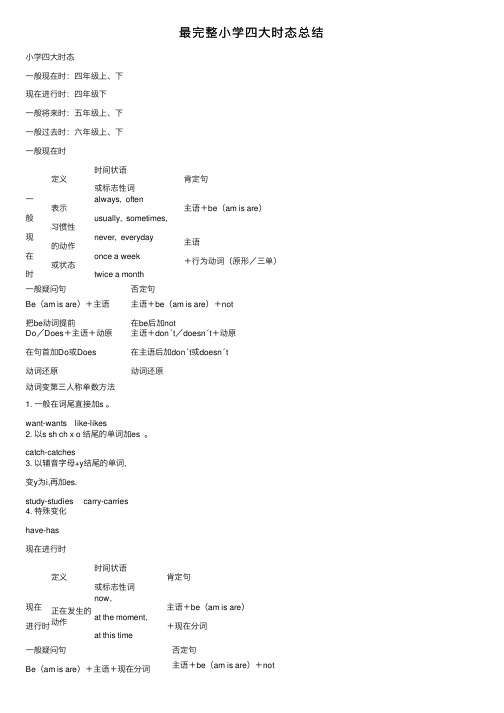小学四年级-一般现在时-进行时-将来时
小学常用的四种基本时态

小学阶段我们总共学习了四种基本时态。
一般现在时、一般过去时、现在进行时和将来时。
现对基本的语法结构和信息词进行归纳、比较,以方便学生复习。
(一)、一般现在时态概念:表示经常发生的或习惯性的动作或目前的状态。
规律:一般用动词原形,当主语为第三人称单数的一般现在时,动词要加s , es , 标志性的单词:always , usually , often , sometimes 如:She usually goes to school on foot .(二)、现在进行时态概念:表示说话时正在发生或进行着的动作。
规律:be + 动词ing 形式.标志性的单词:look , now , listen 如:Look , the boy is playing football .现在分词的变法:1.在一般情况下,动词可直接加-ing,如:do→doing。
2.以重读闭音节结尾的动词,一般要双写尾字母加-ing,如:sit→sitting。
3.去掉词尾的哑e再加-ing,如:take→taking。
(三)、一般过去时态概念:表示过去某一时刻或某一时间内发生的动作或情况。
标志性的单词:yesterday , last Monday , before , ago, the day before yesterday 规律:1、一般情况动词后面加ed ;如:worked , cleaned , washed ,2、以不发音e结尾的动词加d就要以了;如:lived , moved ,loved3、以辅音加y结尾的动词把y改成i再加ed ;如:study– studied , carry—carried4、重读闭音节的动词要双写末尾的辅音字母再加ed;如:stop—stopped shop—shopped skip--- skipped 5. 特殊变化:见不规则动词表。
(四)、一般将来时态概念:用be going to结构表示。
人教版小学英语语法--时态总结(一般现在时-一般过去式-现在进行时-一般将来时)

学生:何一川科目:英语第2阶段第3次课教师:学生:何一川科目:英语第2阶段第3次课教师:带有Be动词的句子,改为一般疑问句的方法:Be+人+其他:He is a good student.-----s he a good student?(第三人称单数用does开头,非第三人称单数用do开头,一二人称互换,l--You,We-You)例题:I usually go to school by bike. --------- Do you usually go to school by bike? (该句人称要互换)He ofte n watches TV on Sundays- ------ D oes he ofte n watch TV on Sun days?They often play football after dinner. ----------- Do they often play football after dinn er?②一般过去时女口果句中出现,last week/last weekend/last month/last year yesterday the day before yesterday X days ago (其中,last是“上一” d的意思,ago是“…前”的意思)等词时,该句子则为一般过去时态。
做题时,只要把动词,改成过去时态。
关键是记忆总结不规贝U动词的过去式。
如:go---went,do---did,swim--swam例题:I visited my grandmother last weekend.They bought a new bike10 days ago.He was ill yesterday.改为一般疑冋句:Did +人+动词(原型)+其他?③现在进行时如果句中出现,look,listen,now等词(看,XX正在做某事;听,XX正在做某事;现在,XX正在做某事)。
(完整版)小学一般现在时-过去式-现在进行时-将来时讲解

四种时态的比较.不规则动词过去式:原形过去式原形过去式原形过去式原形过去式sweep swept teach taught have had go went keep kept think thought do did find found sleep slept buy bought eat ate say said feel felt drink drank is/am was take took read read give gave are were mean meantput put sing sang drive drove meet met cut cut begin began speak spoke make made let let ring rang write wrote see saw fly flew run ran ride rode come came draw drew sit sat hear heard tell toldgrow grew learn learned/learntget got know knew一、用动词的适当形式填空1. My parents _______ (come) from Shandong.2. Sam _______(not like) playing computer games.3. The beautiful girl _______(wear) glasses.4. The Zhang family _______(live) in a flat in Nanjing.5. My father likes _______(read) newspapers after work.6. What _______her classmates _______(call) her teacher?7. _______ you _______(love) each other in your family?8. _______(be) your cousin very clever at maths?9. She is good at dancing. She ________ (sing) very well, too.11. Amy ________(take) her dog for a walk every afternoon.12. Mr. Li ________(not teach) us maths this term. (学期)13. Mr. Chen ________(not like) tea. He ________(enjoy) drinking coffee.14. ________ your father often ________(play) tennis ?No, he loves ________(read) newspapers.15. Everyone in our class ________(like) P.E. a lot.16. Who else ________(want) to come to Millie’s party? I ________.17. Many of them ________(work) hard at their lessons. They _____ (be) cl ever at them.18. What _______ Mary _______(have) for breakfast ?She _______(have) an egg and a glass of milk.19. Our school ________(be) a big nice school. And our teacher ______(be ) a good teacher.20. Simon and Daniel ________(be) American.二、句型转换。
小学四年级时态用法归纳

小学四年级时态用法归纳在小学四年级英语学习中,时态用法是一个关键的学习内容。
正确使用时态可以帮助学生准确表达过去、现在和将来的动作和状态。
本文将对小学四年级常见的时态用法进行归纳总结。
一、一般现在时(Simple Present Tense)一般现在时用于描述经常性、习惯性、客观真理以及现在的情况、态度等。
时态的构成为主语+动词原形。
例句:1. I play football every Sunday.(我每周日都踢足球。
)2. She likes to eat apples.(她喜欢吃苹果。
)3. The sun rises in the east.(太阳从东方升起。
)二、一般过去时(Simple Past Tense)一般过去时用于描述过去发生的动作或状态。
时态的构成为主语+动词的过去式。
例句:1. We visited the zoo last week.(我们上周参观了动物园。
)2. He played basketball yesterday.(他昨天打篮球了。
)3. They went to the beach on vacation.(他们度假去了海滩。
)三、一般将来时(Simple Future Tense)一般将来时用于描述将要发生的动作或状态。
时态的构成为主语+will+动词原形。
例句:1. I will read a book tomorrow.(我明天会读一本书。
)2. She will visit her grandparents next month.(她下个月会去看她的祖父母。
)3. They will have a party on Saturday.(他们周六会举行派对。
)四、现在进行时(Present Continuous Tense)现在进行时用于描述现在正进行着的动作。
时态的构成为主语+am/is/are+动词的-ing形式。
例句:1. She is playing the piano now.(她现在正在弹钢琴。
四年级英语时态总复习

四年级英语时态总复习在小学英语的四年级学习中,学生们已经接触并学习了一些基本的英语时态。
这些时态包括现在时、过去时和未来时,以及它们的各种形式,如进行时、完成时等。
下面我们将对这些时态进行总复习。
一、现在时现在时是学生们最早接触的时态,它表示现在正在发生的事情。
在英语中,我们通常使用动词的现在时形式来表示现在时。
例如:1、I am a student.我是一个学生。
2、He plays football every Sunday.他每周日都踢足球。
二、过去时过去时表示过去发生的事情。
在英语中,我们通常使用动词的过去时形式来表示过去时。
例如:1、We went to the park yesterday.我们昨天去了公园。
2、They finished their homework.他们完成了作业。
三、未来时未来时表示将来会发生的事情。
在英语中,我们通常使用动词的将来时形式来表示未来时。
例如:1、We will visit the museum next week.我们下周会去参观博物馆。
2、They are coming to see you next week.他们下周会来看你。
四、进行时进行时表示正在进行的动作或状态。
在英语中,我们通常使用动词的现在进行时形式来表示进行时。
例如:1、He is studying now.他现在正在学习。
2、They are playing football.他们正在踢足球。
五、完成时完成时表示已经完成的动作或状态。
在英语中,我们通常使用动词的现在完成时形式来表示完成时。
例如:1、I have finished my homework.我已经完成了作业。
2、They have visited many countries.他们已经访问了许多国家。
以上就是四年级英语学习的基本时态,学生们需要能够理解并正确使用这些时态,以更好地理解和使用英语。
高中英语时态总复习英语时态是英语语法中的重要部分,也是学习英语时需要掌握的重要概念之一。
一般现在时-现在进行时-一般将来时

1一般现在时( Present Simple)2。
现在进行时(Present Continuous)3. 将来的安排和打算( Future Arrangements and Intentions)一、一般现在时、现在进行时(一)、辨”个性”一般现在时表示经常性或习惯性的动作,以及主语的特征或状态。
1。
表示主语现在的状态或特征。
例如:I am a teacher.We have a very good relationship with our parents.2。
表示经常性或习惯性动作。
例如:My father goes to work by bike every day。
I always leave home for school at 6:303 。
表示自然现象,普遍真理,客观存在或科学事实。
例如:Shanghai lies in the east of China.The earth moves around the sun.现在进行时表示现在或现阶段正在进行的动作。
例如:1。
表示现在(指说话人说话时)正在发生的事情We are waiting for you at the moment。
2. 表示现阶段正在进行或发生的动作President Xi is visiting in the USA these days。
(二)、辨结构一般现在时的结构是:主 + 动词原形或动词的第三人称单数形式 +...。
.。
现在进行时的结构是: 主 + be(are/ is/am),动词的—ing形式+.。
...。
(三)、辨”信息词"一般现在时常和以下这些时间状语连用:always, often, usually=normally, sometimes=at times, regularly, seldom, never, hardly ever, from time to time, once a month, every day, on Sundays。
一般现在时、现在进行时、一般将来时、一般过去时知识点总结

一般现在时、一般将来时、一般过去时、现在进行时知识总结一、一般现在时一般现在时表示经常性或习惯性的动作,常与表示频度的时间状语连用,如often, usually, always, sometimes, never, seldom, every week/day/year/month..., once a week, on Sundays等。
动词用原形。
当主语为第三人称单数时(he, she, it, 一个人名),动词变为三单形式。
第三人称单数的动词变化规则:(只有在第三人称(he, she, it, 一个人名)为主语的肯定句中,动词才用三单式)(1)一般情况下,直接加s runs gets likes(2)结尾是s, x, sh, ch, o,前为辅音字母,结尾加es watches, goes, washes, crosses, mixes, does(3)动词末尾y,前为辅音,将y改为i加es study→studies fly→flies但在y前如果为元音则直接加s buys says plays(4)不规则变形have—has二、一般将来时一般将来时表示将来发生的事。
常与tomorrow, next day/week/month/year..., soon, in a few minutes, the day after tomorrow, in the future等时间状语连用。
Will/shall +动词原形;(shall用语第一人称)be(am/is/are) going to+ 动词原形三、一般过去时一般过去时表示过去某一时候或某一段时间所发生了的事情或存在的状态。
常与过去时间yesterday,ago, this morning,just now,a moment ago,last night / year / week/month,once upon a time,the other day,before,the day before yesterday, in 1989, at the age of five, one day, then(那时), on that day,in the past连用。
最完整小学四大时态总结

最完整⼩学四⼤时态总结⼩学四⼤时态⼀般现在时:四年级上、下现在进⾏时:四年级下⼀般将来时:五年级上、下⼀般过去时:六年级上、下⼀般现在时定义时间状语或标志性词肯定句⼀般现在时表⽰习惯性的动作或状态always, oftenusually, sometimes,never, everydayonce a weektwice a month主语+be(am is are)主语+⾏为动词(原形/三单)⼀般疑问句否定句Be(am is are)+主语把be动词提前主语+be(am is are)+not 在be后加notDo/Does+主语+动原在句⾸加Do或Does动词还原主语+donˊt/doesnˊt+动原在主语后加donˊt或doesnˊt 动词还原动词变第三⼈称单数⽅法1. ⼀般在词尾直接加s 。
want-wants like-likes2. 以s sh ch x o 结尾的单词加es 。
catch-catches3. 以辅⾳字母+y结尾的单词,变y为i,再加es.study-studies carry-carries4. 特殊变化have-has现在进⾏时定义时间状语或标志性词肯定句现在进⾏时正在发⽣的动作now,at the moment,at this time主语+be(am is are)+现在分词⼀般疑问句否定句Be(am is are)+主语+现在分词主语+be(am is are)+not把be动词提前+现在分词在be后加not 动词变现在分词⽅法1. ⼀般直接加ing。
read-reading fly-flying2. 以不发⾳e结尾的单词,去e加ing。
make-making come-coming3. 以辅+元+辅结尾的单词,双写尾字母,再加ing。
swim-swimming run-running4. ie结尾变成y,再把ing加。
die-dying lie-lying⼀般将来时定义时间状语或标志性词肯定句⼀般将来时将来某个时刻发⽣的动作或状态next…… laterin two hourstomorrow主语+will+动原主语+be going to+动原⼀般疑问句否定句Will+主语+动原把will提前主语+will+not+动原在will后加not缩写won′tBe+主语+going to+动原把be动词提前主语+be+not+ going to +动原在be后加not⼀般过去时定义时间状语或标志性词肯定句⼀般过去时过去发⽣的动作或状态last ……agoyesterdayjust now主语+be(was were)主语+动词过去式⼀般疑问句否定句Be(was were)+主语把be动词提前主语+be(was were)+not 在be后加notDid+主语+动原主语+didn′t+动原。
- 1、下载文档前请自行甄别文档内容的完整性,平台不提供额外的编辑、内容补充、找答案等附加服务。
- 2、"仅部分预览"的文档,不可在线预览部分如存在完整性等问题,可反馈申请退款(可完整预览的文档不适用该条件!)。
- 3、如文档侵犯您的权益,请联系客服反馈,我们会尽快为您处理(人工客服工作时间:9:00-18:30)。
一.用括号内动词的适当形式填空。
1. He often ________ (have) dinner at home.2. Daniel and Tommy _______ (be) in Class One.3. We _______ (not watch) TV on Monday.4. Nick _______ (not go) to the zoo on Sunday.5. ______ they ________ (like) the World Cup?6. What _______they often _______ (do) on Saturdays?7. _______ your parents _______ (read) newspapers every day?8. The girl _______ (teach) us English on Sundays.9. She and I ________ (take) a walk together every evening.10. There ________ (be) some water in the bottle.11. Mike _______ (like) cooking.12. They _______ (have) the same hobby.13. My aunt _______ (look) after her baby carefully.14. You always _______ (do) your homework well.15. I _______ (be) ill. I’m staying in bed.16. She _______ (go) to school from Monday to Friday.17. Liu Tao _______ (do) not like PE.18. The child often _______ (watch) TV in the evening.19. Su Hai and Su Yang _______ (have) eight lessons this term.20. -What day _______ (be) it today?-It’s Saturday.二.按照要求改写句子1. Daniel watches TV every evening.(改为否定句)___________________________________________________2. I do my homework every day.(改为一般疑问句,作否定回答)________________________________________________________ 3. She likes milk.(改为一般疑问句,作肯定回答)___________________________4. Amy likes playing computer games.(改为一般疑问句,作否定回答) ___________________________________________________5. We go to school every morning.(改为否定句)_______________________________________________________6. He speaks English very well.(改为否定句)___________________________________________________7. I like taking photos in the park.(对划线部分提问)________________________________________________________8. John comes from Canada.(对划线部分提问)___________________________________________________9. She is always a good student.(改为一般疑问句,作否定回答)________________________________________________________10. Simon and Daniel like going skating.(改为否定句)1.现在进行时表示现在正在进行或发生的动作,也可表示当前一段时间内的活动或现阶段正在进行的动作。
2.现在进行时的肯定句基本结构为be(is/am/are)+动词ing.3.现在进行时的否定句在be后加not。
4.现在进行时的一般疑问句把be动词调到句首。
eg. He is doing his homework now?——Is he doing his homework now?5.现在进行时的特殊疑问的基本结构为:疑问词+ be + 主语+ 动词ing? eg. Where are you going?但疑问词当主语时其结构为:疑问词+ be + 动词ing? eg. Who is singing?6. 标志词:Look! Listen! now动词现在分词的变化见下表:词尾情况变化方式例词一般情况加—ing play玩—playing do做—doin g go去—goingjump跳—jumping sing唱—singin g ski滑雪—skiingsee看见--seeing以不发音的e结尾去e加—ingmake做—making take拿到—taking like喜欢—likingcome来—coming write写—writing dance跳舞—dancinghave有—having close关—closing以重读闭音节结尾的动词,中间只有一个元音字母,词尾只有一个辅音字母双写最后一个辅音字母再加—ingswim游泳—swimming sit坐—sitting run跑—runningget得到—getting put放—putting begin开始—beginningjog慢跑—jogging一、写出下列动词的现在分词:play________ run__________ swim _________ make____ ______ go_________ write________ski___________ read________ have_________ dance____ _____ put_________ see________buy _________ love____________ live_______ take_____ ____ come ________ get_________stop_________ sit ________ begin________ shop_______二、用所给的动词的正确形式填空:1. Listen .Some girls _______________ (sing)in the classr oom .2. What _____ you ______ ( do ) now?3. Look . They _______________( have) an English lesso n .4.They ____________(not ,water) the flowers now.5.Look! the girls ________________(dance )in the classro om .6.What is our granddaughter doing? She _________(listen ) to music.7. It’s 5 o’clock now. We _____________(have)supper no w8.______Helen____________(wash )clothes? Yes ,she is .三、句型转换:1. They are doing housework .(分别改成一般疑问句和否定句)_________________________________________________ ____________2.The students are cleaning the classroom . ( 改一般疑问句并作肯定和否定回答)_________________________________________________ ________________3.I’m playing the football i n the playground .(对划线部分进行提问)_________________________________________________ ________________4.Tom is reading books in his study . (对划线部分进行提问)_________________________________________________ ________________一般将来时一、按要求填空1. 我打算明天和朋友去野炊。
I_____ _______ _________ have a picnic with my friends. I ________ h ave a picnic with my friends. 2. 下个星期一你打算去干嘛? 我想去打篮球。
What ________ ________ _________ _________ _________ next Mond ay? I _______ ______ _____ play basketball. What _________ you do n ext Monday? I ________ play basketball.3. 你妈妈这个周末去购物吗?是,她要去买一些水果。
_____ your mother _______ ________ go shopping this ___________? Y es, she _________. She ______ ________ __________ buy some fruit.4. 你们打算什么时候见面。
What time _______ you _________ __________ meet?二、改句子。
5. Nancy is going to go camping.(改否定)Nancy ________ going to go camping. 6. I’ll go and join them.(改否定) I _______ go ______ join them.7. I’m going to get up at 6:30 tomorrow.(改一般疑问句) ________ _______ ________ to get up at 6:30 tomorrow? 8. We w ill meet at the bus stop at 10:30.(改一般疑问句) _______ ________ meet at the bus stop at 10:30.9. She is going to listen to music after school.(对划线部分提问) ________ _______ she ________ ________ _________ after scho ol? 10. My father and mother are going to see a play the day after tomorr ow.(同上) _________ _________ going to see a play the day after tomorrow。
